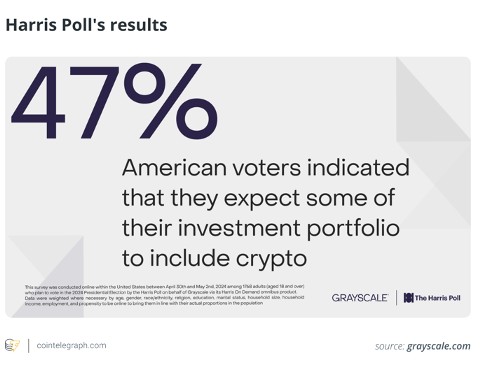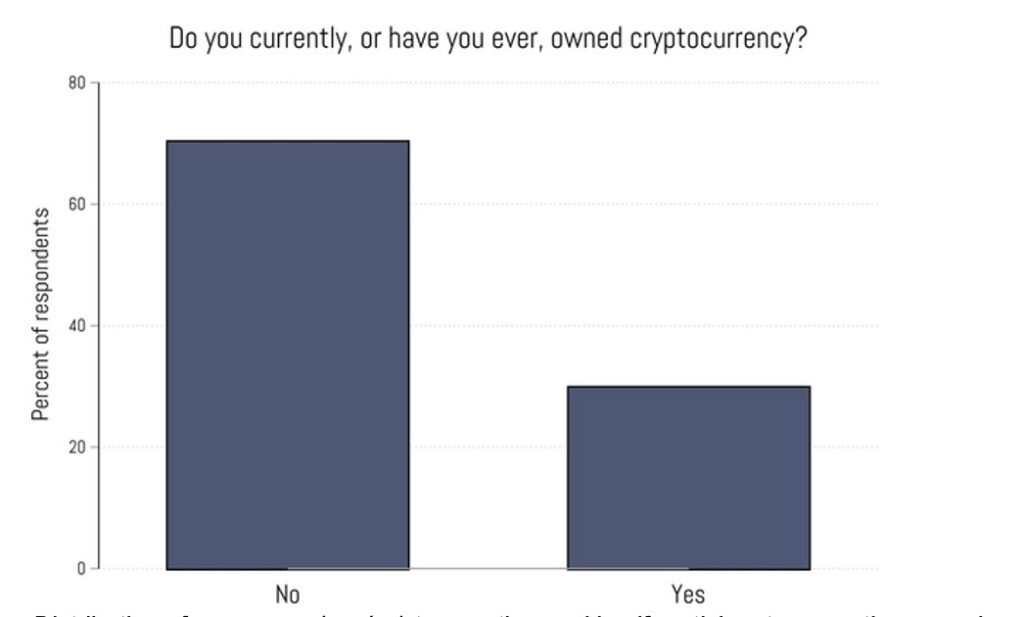Cryptocurrencies have always been volatile, but things get even more interesting and unpredictable when politics get involved. As the 2024 US Presidential election approaches, the role of politics in shaping cryptocurrency markets and trading behavior has become a hot topic, and the influence of politicians and events in this regard is equally undeniable.
As suggested by a reputable crypto media platform, political leaders who support crypto innovation are likely to attract younger, more tech-savvy voters. On the other hand, those who advocate for strict regulation may appeal to voters concerned about security and fraud. How these candidates approach cryptocurrencies could influence voter opinions and, consequently, the market.
What do the numbers tell us?
The growing importance of cryptocurrencies in American politics is evident, with presidential candidates now accepting donations in cryptocurrencies. A November 2023 Harris Poll showed that 47% of American voters believe cryptocurrencies will be part of their investment portfolio in some form. This, combined with the approval of Bitcoin and Ethereum exchange-traded funds (ETFs), indicates that the future of cryptocurrencies is bright.


Source: Cointelegraph
Interestingly, a Grayscale-sponsored Harris Poll in April found that: “Almost half.” Voters “Don't trust any political candidate who meddles with cryptocurrency.” Additionally, the report suggested that three in 10 people are likely to support pro-crypto politicians.


Source: Harris Poll Insights 2024
Historical background
Looking back at 2017, President Trump's signing of the Tax Cuts and Jobs Act had a major impact on the stock market and the cryptocurrency market. This act caused a huge increase in the value of Bitcoin, with the cryptocurrency reaching nearly $20,000 in December 2017.
However, the price of Bitcoin fell in 2018 when the Trump administration cracked down on cryptocurrency scams and fraudulent ICOs, showing that political events and statements can have a positive or negative impact on the market.
The impact of politics on cryptocurrencies is not limited to the United States. Political events and figures around the world also affect the market. For example, regulatory decisions in China have historically caused significant market fluctuations. In 2021, China's crackdown on Bitcoin mining caused a significant drop in the price of Bitcoin.
Conversely, El Salvador's announcement that Bitcoin would become legal tender had an upward impact on the market. According to data, Bitcoin's closing price in June of that year was around $35,127.08, but by September, the price of BTC had closed at $43,858.37, again reflecting the market's sensitivity to political decisions.
“Trump Trade” and Cryptocurrencies
He once called Bitcoin ” “scam” and, “Competing with the dollar” He wanted to leave it “World Currency” He recently voiced strong support for the industry.
Promises to help U.S. crypto miners and ease regulations have garnered support and funding from the industry, including $1 million worth of Ethereum (ETH) from the former CEO of Kraken. Jesse Powellplus $2 million worth of Bitcoin (BTC) The Winklevoss Twinsand counting.
This change in attitude is often “Trump Trade” Bitcoin has become a key issue in the 2024 election.
The Trump Trade refers to the simultaneous surge in U.S. stocks, Treasury yields, and the dollar following Donald Trump's victory in the 2016 presidential election. Bernstein analysts suggest that cryptocurrencies could emerge as a major Trump Trade in the current election cycle as the Republican Party's prospects improve and the party's standard-bearer increasingly takes a pro-cryptocurrency stance.
This shift in political stance on cryptocurrencies is not just a campaign fundraising strategy, but also reflects the growing importance and acceptance of digital assets in the political arena.
The Cryptocurrency Voterbase
Moreover, the crypto voter base is a diverse group, not only in terms of political allegiances, but also in terms of social and psychological characteristics. Experts are divided on how the 2024 elections will affect the crypto market. Some believe the market could rise if a pro-crypto candidate wins the election. Others worry that too much freedom could lead to fraud and instability.
A study published in the journal PLOS ONE in 2022 found that 30% of American adults own some form of cryptocurrency. These people have a range of political beliefs and identities. The study also revealed that the cryptocurrency market can change significantly around election time.


Source: PLOS ONE reportt
How cryptocurrency policy will impact the election
Crypto policy is playing a bigger role than ever before in the 2024 presidential election. This is the first election in which major candidates will actively discuss crypto. For example, as noted earlier, Trump is now accepting crypto donations for his campaign and is funding crypto industry advocates like the CEO of Messari. Ryan Serkis A platform for people to speak their beliefs. This is the start of his efforts to rally voters in favor of crypto and against central bank digital currencies (CBDCs).
Meanwhile, the Biden campaign claims to be in talks with cryptocurrency companies to seek proper advice. “Advancing the Cryptocurrency Community and Cryptocurrency Policy” Biden vetoed Staff Accounting Bulletin 121 (SAB121), a bill submitted by the SEC in May that would have allowed financial institutions to host cryptocurrencies. “It puts the well-being of consumers and investors at risk.”
Clearly, President Trump's pro-crypto stance is putting pressure on the president. Joe Biden Biden is trying to tone down his previously aggressive stance, but many believe he is taking a firm stance against the cryptocurrency industry.
If Trump wins the election, it could lead to increased investment in cryptocurrencies. If the election results are Republican, cryptocurrencies could become Trump's main trade, and hopes of an improved regulatory environment could change the outlook for blockchain.
Perhaps as part of the Trump campaign's ongoing efforts to secure the crypto vote, Decrypt Media recently reported that Trump, despite escaping an assassination attempt involving The Weeknd, is set to speak at a historic Bitcoin conference in Nashville less than two weeks from now.
The intersection of politics and cryptocurrency is a fascinating and complex topic. There is no denying the impact that politicians and political events have on cryptocurrency markets and trading behavior. And as the CEO of Coinbase Brian Armstrong last year, “Going into 2024, being against cryptocurrencies is a really bad political strategy.” And here we are.
author: Ayanfe Fakunle
The editorial team at #DisruptionBanking has taken all precautions to ensure that this article does not adversely affect any person or organisation, nor does it provide financial advice of any kind. This article does not constitute financial advice.

